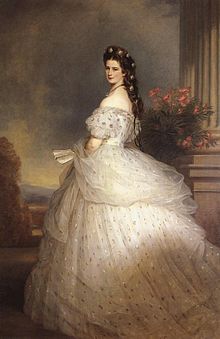My history-teacher friend Katrina asked me if I wanted to go see an Austrian musical with her (she grew up in Austria). When I found out it was Elisabeth, I realized I already knew the music because we had played an arrangement in Stadtmusik Kandern (community band). Katrina went to relish the Austrian history, and I went to appreciate the music and everything else. So today, I saw my first musical in German!
An example of melodramatic Austrian art, this musical is about the life of Elisabeth, or “Sissi,” the famed Empress of Austria and Queen of Hungary. Though she is a real person and the musical does document some actual events from her life, it is largely fantasized and exaggerated.
Luigi Lucheni, Sissi’s murderer, narrates. The musical begins at his after-life judgement, during which he must account for his murderous deed. His plea: innocence – she wanted to die. He then tells the story of her tragic life and her love-hate relationship with death.
Sissi was born a duchess in Bavaria (now southeast Germany). Her sister was destined to be the Empress of Austria – she was to marry Franz Josef, the heir to the empire. But when the family went to meet Franz Josef, he fell in love with the free-spirited and beautiful Sissi and proposed to her instead. The wedding bells tolled a death of sorts for her – a death of freedom and a carefree way of life and into the cage of royalty.
Death is personified; he struts around as a fair-haired man with a seductive voice. During times of Sissi’s doom and depression (at her wedding, after her loss of freedom, after the loss of her first daughter), he tries to seduce her. They dance and come within inches of kissing. He also influences Sissi’s only son to commit suicide.
My friend Kristin wrote a blog post about death’s personified roles in fairy tales and literature. She noted that “death comes to all, but death comes to some who are young and some who are old, and some suffer in death and some go peacefully.” In the case of the musical Elisabeth, Sissi went to Death gladly, even lustfully, though it was the weapon of a mad assassin that actually took her. Her son, however, was like a puppet being controlled by Death, even in his suicide. The contrast seems to stand on its head; one would think that a person who commits suicide would be longing for death, while a person murdered would feel that Death had stolen life. Yet in this portrayal of the event, the son was actually longing for his mother’s love, not for death; he had been deprived of his mother’s comfort by the overbearing mother-in-law (Franz Josef’s mother). Sissi in her depression did long for death, but it took the needle file of Lucheni to give her Death’s kiss.
It was a fascinating musical; it gave me food for thought and helped me brush up on the history of the Habsburg Empire (thanks to Katrina’s help!). As she reminded me, Sissi’s son’s nephew was Archduke Franz Ferdinand, the guy whose assassination started World War I.

